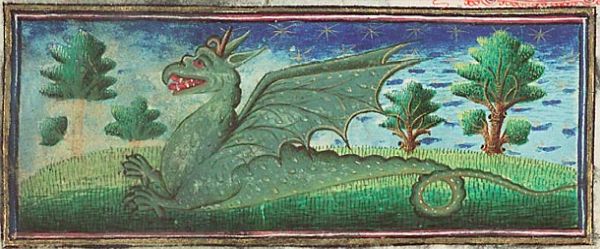The three days before Ascension Thursday are the Minor Rogation Days (the Major Rogation took place on April 25). Formerly, these were days of prayer, fasting and procession. Courtesy of fisheaters.com, here is a description of Rogation processions in the Middle Ages (full text here):
And in this procession the Cross is borne, the clocks and the bells be sounded and rung, the banners be borne, and in some churches a dragon with a great tail is borne. And aid and help is demanded of all Saints.
And the cause why the Cross is borne and the bells rung is for to make the evil spirits afraid and to flee; for like as the kings have in battles tokens and signs-royal, as their trumpets and banners, right so the King of Heaven perdurable hath His signs militant in the Church. He hath bells for business and for trumps, He hath the Cross for banners. And like as a tyrant and a malefactor should much doubt when he shall hear the business and trumps of a mighty king in his land, and shall see his banners, in like wise the enemies, the evil spirits that be in the region of the air, doubt much when they hear the trumpets of God which be the bells rung, and when they see the banners borne on high. And this is the cause why the bells be rung when it thundereth, and when great tempests and outrages of weather happen, to the end that the fiends and the evil spirits should be abashed and flee, and cease of the moving of tempests. Howbeit also that there is another cause therewith; that is for to warn the Christian people, that they put them in devotion and in prayer, for to pray God that the tempest may cease.
There is also the banner of the King, that is the Cross, which the enemies dread much and doubt. For they dread the staff with which they have been hurt. And this is the reason wherefore in some churches in the time of tempest and of thunder, they set out the Cross against the tempest to the end that the wicked spirits see the banner of the sovereign King, and for dread thereof they flee. And therefore in procession the Cross is borne, and the bells rung for to chase and hunt away the fiends being in the air, and to the end that they leave to tempest us. The Cross is borne for to represent the victory of the Resurrection, and of the Ascension of Jesu Christ. For He ascended into Heaven with all a great prey. And thus this banner that flyeth in the air signifieth Jesu Christ ascending into Heaven.
And as the people follow the Cross, the banners, and the procession, right so when Jesu Christ styed up into Heaven a great multitude of Saints followed Him. And the song that is sung in the procession signifieth the song of angels and the praisings that came against Jesu Christ and conducted and conveyed Him to Heaven where is great joy and melody.
In some churches, and in especial in them of France, is accustomed to bear a dragon with a long tail filled full of chaff or other thing. The two first days it is borne before the Cross, and on the third day they bear it after the Cross, with the tail all void, by which is understood that the first day tofore the law, or the second under the law, the devil reigned in the world, and on the third day, of grace, by the Passion of Jesu Christ, he was put out of his realm.
No comments:
Post a Comment